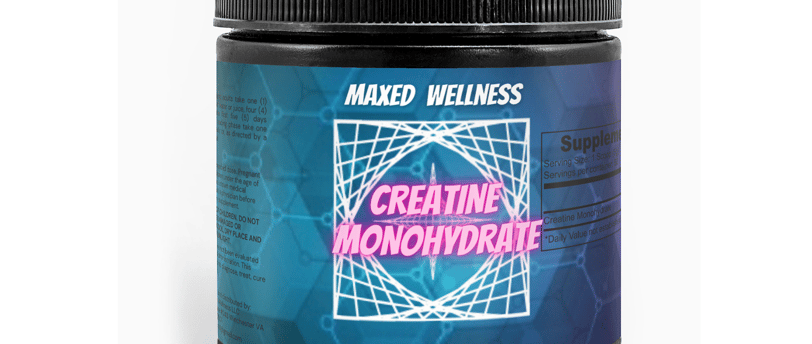What Does Creatine Actually Do?
The truth on creatine and how it can boost performance
Evan Walsh
1/10/20243 min read


Almost every lifter takes, has taken, or eventually will take creatine (specifically creatine monohydrate) in an attempt to boost performance in the gym. People say, “it makes you stronger”, “it helps you gain size” , but it seems that most people do not truly understand how creatine can help you increase your performance in the gym.
First of all, what even is creatine? Creatine is a compound made of amino acids that is present in the body and is most known for its role in regenerating ATP. It is mostly found in the skeletal muscle and can exist in different states, most namely phosphocreatine. Phosphocreatine plays a key role in energy production in the body. Phosphocreatine is simply creatine with a phosphate group attached to it. Our body runs off of the transfer of phosphate groups, most notably by way of adenosine triphosphate or (ATP). When our body is in need of energy as ATP is depleted, phosphocreatine can shed its phosphate group leaving behind creatine and providing a phosphate group to convert adenosine diphosphate (ADP) to adenosine triphosphate (ATP). ATP is the fuel that keeps our body going, and ADP is a lower energy form that is the result of ATP losing a phosphate group. Increasing the ratio of ATP to ADP allows for the body to have more available energy, and can allow you to push harder in the gym. Having more creatine and in result more phosphocreatine can allow the body to more readily create ATP in times of energy depletion, most notably in an anaerobic state. Now, how does this help you in the gym?
A 2007 study found that a group of individuals taking a creatine/carbohydrate/protein supplement had statistically significant increases in body mass, lean body mass, and 1RM strength in the bench press, squat, and pulldown (link to study below). There is also evidence from another study that creatine supplementation can increase the number of satellite cells. Satellite cells respond to muscle injury/degradation and respond by proliferating and creating myoblasts. These myoblasts then fuse together to form new muscle fibers. Having more satellite cells activated at the site of muscular injury (the goal of hypertrophy) results in an increase in muscle mass being regenerated.
Creatine also seems to have positive effects on mental health and efficiency. A review published in 2018 found that creatine supplementation resulted in greater short-term memory as well as improved decision making. The subjects how experienced these positive benefits used oral creatine supplementation just as anyone else using it for exercise performance would. Researchers have been so intrigued by the possible brain health benefits of creatine that there have been trials using creatine supplementation as a therapeutic for those with ALS, Huntington's Disease, and even Alzheimer's.
Overall, these studies allude to creatine increasing both size and strength when coupled with resistance training, and they also show that creatine could be beneficial for brain health.. That seems great, but are there any downsides to creatine supplementation? I have read many articles that have tried to see if there were any negative effects of creatine supplementation. Overall, the general consensus seems to be that if you use the recommended dose of 5 g per day there are no obvious negative side effects. Now, that doesn’t mean that there aren’t any at all. It just means that at face value and with the current research, there isn’t anything that jumps out and makes doctors recommend people stay away from creatine. I personally do use creatine and have not experienced any negative side effects. With that being said, I recommend getting a blood test before starting any supplementation and testing it again after a few months to check for any abnormalities. Overall, creatine seems to be a great supplement for athletic performance.
References:
CRIBB, PAUL J.1; WILLIAMS, ANDREW D.2; HAYES, ALAN1. A Creatine-Protein-Carbohydrate Supplement Enhances Responses to Resistance Training. Medicine & Science in Sports & Exercise 39(11):p 1960-1968, November 2007. | DOI: 10.1249/mss.0b013e31814fb52a https://pubmed.ncbi.nlm.nih.gov/17986903/
Konstantinos I. Avgerinos, Nikolaos Spyrou, Konstantinos I. Bougioukas, Dimitrios Kapogiannis, Effects of creatine supplementation on cognitive function of healthy individuals: A systematic review of randomized controlled trials,Experimental Gerontology, Volume 108, 2018, Pages 166-173, ISSN 0531-5565, https://doi.org/10.1016/j.exger.2018.04.013.
Olsen, S., Aagaard, P., Kadi, F., Tufekovic, G., Verney, J., Olesen, J.L., Suetta, C. and Kjær, M. (2006), Creatine supplementation augments the increase in satellite cell and myonuclei number in human skeletal muscle induced by strength training. The Journal of Physiology, 573: 525-534. https://doi.org/10.1113/jphysiol.2006.107359
Schröder, H., Terrados, N. & Tramullas, A. Risk assessment of the potential side effects of long–term creatine supplementation in team sport athletes. Eur J Nutr44, 255–261 (2005). https://doi.org/10.1007/s00394-004-0519-6